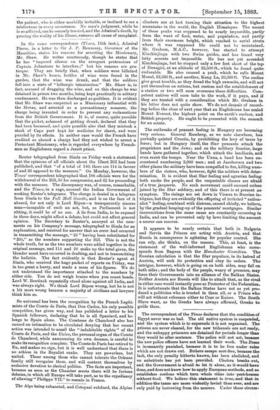Renter telegraphed from Simla on Friday week a statement, that
the opinions of all officials about the Ilbert Bill had been published, and that " of a total of 140, there are 114 in favour of and 26 opposed to the measure." On Monday, however, the Times' correspondent telegraphed that 188 officials were for the withdrawal of the Bill, 36 for compromise, and 62 for proceeding with the measure. The discrepancy was, of course, remarkable, and the Times, in a rage, accused the Indian Government of cooking Renter's telegrams. The charge is denied in a telegram from Simla to the Pall Mall Gazette, and is on the face of it absurd, for not only is Lord Ripon—a transparently sincere man—incapable of such an act, but, as Parliament is not sitting, it could be of no use. A lie from India, to be exposed in three days, might affect a debate, but could not affect general opinion. The Secretary to Renter's, annoyed at the com- ments on his Company's message, telegraphed to Simla for an explanation, and received for answer that an error had occurred in transmitting the message, " 26 " having been substituted for "205," as the numbers supporting the Bill. This is not the whole truth, for as the two numbers were added together in the original message, and 114 and 26 make up the total given, the blunder must have occurred in drafting, and not in transmitting the bulletin. The fact evidently is that Renter's agent at Simla, who received the huge packet of reports on Friday, was in too great a hurry, and made a mess of his figures. We do not understand the importance attached to the numbers by
either side. You do not weigh brains when you count beads. Lord W. Bentinck repeatedly stood alone against all India, and was always right. We think Lord Ripon wrong, but he is not a bit more wrong because a majority of civilians and lawyers think him so.


































 Previous page
Previous page